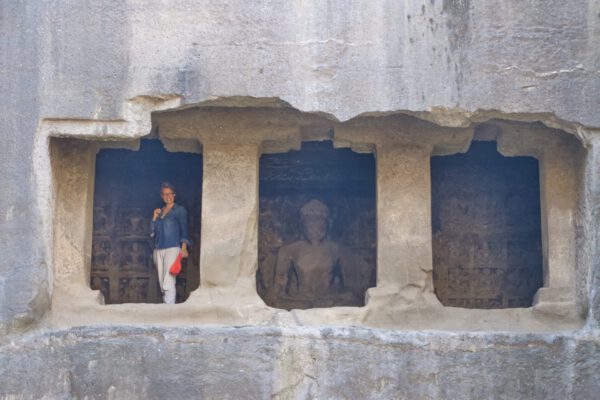Se have been reading in India for three weeks now: Deleuze, Upanishads, Sri Aurobindo. Sometimes I meditate in between. The rest is still a remnant of everyday life from the New World. Reading the news, consuming entertainment media, organizing things that don't really have any meaning here, but need continuity so that they don't break down in old Europe and the New World.
So reading... It seems to me that I have been preparing myself to read here for decades. My thinking oscillates between Deleuze and the Upanishads. This wisdom in India, that everything is one, and the whole universe exists only because the self wants to know itself, is so incredibly strong that I still only guess how deep this thought is. Schopenhauer's title 'The World as Will and Representation' starts to make sense, Deleuze reference to Spinoza as a spiritual thinker of immanence also makes sense. I don't yet dare to read Deleuze's book on immanence again. Instead, 1000 Plateaus... This book, which is not a book at all, but a machine, a thinking machine (Professor Dr. Dr. Dr. Augustus van Dusenalso The thinking machine sends its regards)...
I have designed seminars with the book without ever really understanding it. In fact, it's hardly even readable. It's more of an instrument. An attempt to think about the world in a fundamentally different way. Conventional capitalist, dualistic, categorical thinking is challenged on every page. I have always wondered how Deleuze and Guattari arrived at such a level of consciousness. How did they manage to move so far away from the prevailing ideology that they seem like prophets of a more inclusive way of thinking? I wanted to find out together with my students. We failed, of course, but we were fine, and we saw the world differently afterwards, and that's what a university is all about, isn't it?
Deterritorialization
But now the worlds of thought connect. The biological references, the central position of art (which is much more exciting with animals than with humans), thinking in immanence, the flying lines, territories and abstract machines. For me, all of this can really only be understood from the Upanishads. And today I found a quote that I would like to share. It's about deterritorialization. A complicated term that builds on many other complicated terms. But the basic idea seems to me to be that the world is made up of its elements. These are first formed in strata/layers (e.g. geological layers). Within these layers, the elements resonate with each other, they form a rhythm and thus create a milieu. This can be visualized quite vividly in the animal kingdom, e.g. birdsong, there are refrains and rites... This milieu creates a territory, a home. The self in this territory, where it is at home, is shaped by the layers, milieus, rhythms etc... and creates a home through the creation of art, for example. It expresses itself, creates signs and symbols, it becomes semiotic and enters the realm of art (this can be the pattern of a butterfly, the house construction of a Bowerbirda house. Within this territory there are then movements, including movements of thought, that lead out of it. Life, thoughts, the earth deterritorialize them. So now the quote in a DeepL translation of the English original (D stands for the function of deterritorialization):
"This is already evident in the mystery of "birth", in which the earth as a glowing, eccentric or intense focus lies outside the territory and exists only in the movement of D. Even more, the earth, the glacial land, is deterritorialization par excellence: therefore it belongs to the cosmos and presents itself as the material through which humans tap into cosmic forces. One could say that the earth as deterritorialization is itself the strict correlate of D. This goes so far that D can be described as the creator of the earth - a new land, a universe, not just a reterritorialization.
This is the meaning of "absolute". The absolute does not express anything transcendent or undifferentiated. It does not even express a magnitude that would transcend all given (relative) magnitudes. It only expresses a kind of movement that is qualitatively different from relative movement."
I will spend the next few months trying to understand what that really means.
Here is the original:
"This can already be seen in the mystery of the "natal," in which the earth as ardent, eccentric, or intense focal point is outside the territory and exists only in the movement of D. More than that, the earth, the glacial, is Deterritorialization par excellence: that is why it belongs to the Cosmos, and presents itself as the material through which human beings tap cosmic forces. We could say that the earth, as deterritorialized, is itself the strict correlate of D. To the point that D can be called the creator of the earth-of a new land, a universe, not just a reterritorialization.
This is the meaning of "absolute." The absolute expresses nothing transcendent or undifferentiated. It does not even express a quantity that would exceed all given (relative) quantities. It expresses only a type of movement qualitatively different from relative movement." Deleuze 1000 Plateaus p. 509







